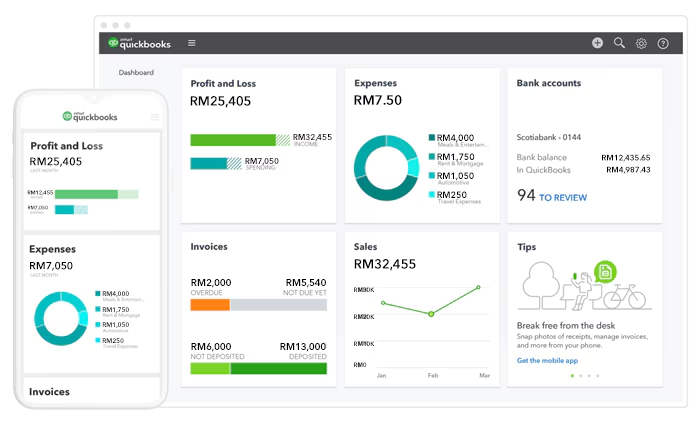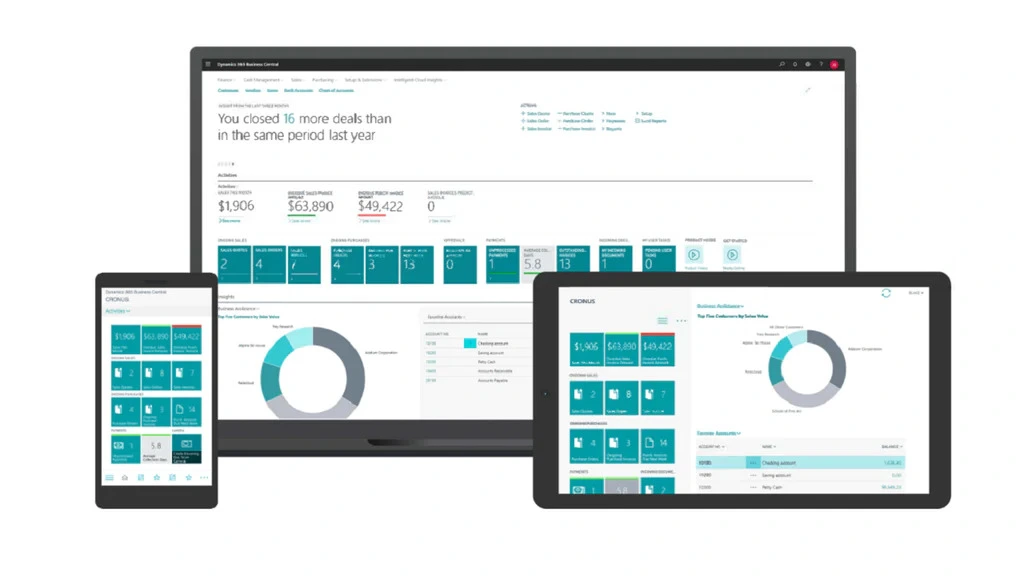Often when businesses start out as a small enterprise, they require basic accounting software that’s easy to use for only one bookkeeper or two. There are no complicated requirements like reporting and advanced financial management except recording cash inflows and outflows and calculating taxes and depreciations. So, a simple and specific accounting system like QuickBooks might suffice.
As small businesses grow, their needs evolve. They often require more than basic accounting; they may need more system functionalities to cover their new needs for legal compliance, inventory and supply chain management, project billing, and warehousing. So, they need a solution that scales with them, integrates seamlessly with other systems, covers various processes, and offers robust reporting. This is where Dynamics 365 Business Central comes into play.
In this expert blog, we’ll delve into both the systems, unravelling their strengths, weaknesses, and core features to help you make an informed choice between QuickBooks and Business Central.
QuickBooks: A Closer Look
QuickBooks, developed by Intuit, has been a household name in accounting software for decades. It offers various versions, including QuickBooks Online Plus, QuickBooks Enterprise Solutions Platinum, Gold, and Silver, each with increasing functionality. QuickBooks excels in payroll and credit card processing, making it a popular choice for small businesses and accountants. But it’s deep specialisation in accounting management has also become it’s Achilles heel for its customers, particularly the ones that are rapidly growing.
QuickBooks Strengths:
- User-Friendly: It’s renowned for its user-friendly interface, with simple forms and report customisation, that is super-easy to use, reducing training costs.
- Deployment Options: QuickBooks deployment is simple and quick, allowing you to choose between single-tenant configurations and public or private cloud hosting.
- Integrated Payroll and Payment Processing: It also comes with seamlessly integrated payroll and payment processing capabilities as these are part of Inuit’s core product offerings. But that also means, you will be confined to the OEM tools only.
QuickBooks Weaknesses:
- Limited Scalability: QuickBooks becomes sluggish as your business scales, with performance issues as number of users and transactions grows. It also has limitations on the number of records you can store in the system. Beyond a certain transaction volume and number of users, you have to delete the existing records or users to add more.
- Weak Security and User Roles: Its weak user roles and security options can lead to data errors, unauthorised data access, and even internal information thefts.
- Poor Audit Trails: QuickBooks does not allow viewing of user activity records and cannot display real-time login and logoff data. Likewise, it also does not track users making changes in master records.
- Limited Reporting and Analytics: Reporting and data analytics options are limited in QuickBooks, thus, affecting customer insights and predictive capabilities.
- Data Access Difficulty: You will need a third-party tool to clone QuickBooks data in another environment for unlimited access to data. Even then you will only gain read-only access.

Microsoft Dynamics 365 Business Central: Unleashing Potential
Microsoft Dynamics 365 Business Central is a powerful enterprise planning solution with customer relationship management capabilities, designed to cater to the complex requirements of growing small and mid-sized businesses. It offers a comprehensive suite of features that go beyond traditional accounting, addressing many of QuickBooks’ limitations and providing scalability, robust reporting, and more.
Dynamics 365 Business Central Strengths:
- Comprehensive Functionality: Business Central offers much more than just accounting capabilities. Not only does it combine enterprise resource planning with customer relationship management, but it also offers more functions to efficiently manage finance, supply chain, sales and marketing, inventory and warehouse, manufacturing, digital services, human resource, and projects.
- Cost vs Value: Business Central pricing starts at £57.50 per user per month for Essentials version and £82.20 per user per month for Premium. Considering the fact that QuickBooks costs between £10 to £70 per month, it may seem budget-friendly initially. However, using QuickBooks can become costly as your business needs grow and QuickBooks requires additional functionalities. On the contrary, Business Central appears to have a higher initial cost but it offers comprehensive capabilities right from the beginning, futureproofing your business. That way, you can avoid expensive future add-ons as your organisation grows. Learn how Business Central licensing works here.
- Robust Audit Trail: Unlike QuickBooks, Business Central offers robust audit trails using the change log feature. It allows you to track all direct modifications a user makes to data in the database, giving you a clear visibility over what changed, who changed it, and when the change occurred.
- Strong User Roles: Business Central’s well-defined user roles ensure data security by providing users with role-based access. That way, only the authorised users can gain access to the system database, limiting possibilities of unwanted data theft. You can also limit and monitor user access, for instance, to keep one department, say marketing or sales, from accessing the files and data of another department, say accounting or HR.
- Advanced Reporting and Analytics: Business Central comes with built-in analytics and reporting features to provide comprehensive business intelligence. In addition, it can also work seamlessly with external business intelligence tools like Power BI, Excel, external data warehouses, and customer APIs.
- Seamless Integration: It effortlessly integrates with the Microsoft tech stack, including other Dynamics 365 apps, Power Platform, Microsoft 365, SharePoint, and Teams. What it does for you is streamline workflows and boost collaboration significantly. Additionally, it also integrates easily with third-party solutions using custom APIs so that you can also use non-Microsoft technologies with Business Central.
- Add-on Options: Business Central allows you to fill software gaps using out-of-the-box tools and add-ons through Microsoft AppSource, like Sirius Payroll 365, or Power Apps. That means you’re not restricted to OEM tools and features and flexibly enhance your Business Central with add-ons that best fit your needs.
For a detailed information on the overall capabilities of Dynamics Business Central, download our Business Central eBook.
Dynamics 365 Business Central Weaknesses:
- Complexity: Its comprehensive feature offering might be overkill for sole business owners and very small businesses with 5 employees or less, particularly, if they only have core accounting needs.
- Implementation Investment: Setting up Business Central requires time, professional assistance, and data migration, leading to implementation costs, in addition to product licensing costs. But that’s worth all the time and money you put into it since what you’ll get at the end is a scalable and reliable solution that streamlines your financial management and resource planning.

Comparison Table: QuickBooks vs. Dynamics 365 Business Central
Here’s a quick overview of how QuickBooks and Dynamics 365 Business Central stack up:
| | Feature | Business Central | QuickBooks |
| 1 | Overall Functionality | Very Good, For Overall Financial Management and Resource Planning | Good, For Accounting and Bookkeeping |
| 2 | Scalability | Good | Poor |
| 3 | Deployment | SaaS Only (On-Premise Available) | SaaS or On-Premise |
| 4 | Payroll | Yes, Through Out-of-the-Box App | Yes, As an Add-On |
| 5 | Reporting | Very Good | Poor |
| 6 | Security Roles | Very Good | Poor |
| 7 | Audit Trail | Very Good | Poor |
| 8 | Payment/Credit Card Processing | Yes, Through Out-of-the-Box App | Yes, As an Add-On |
| 9 | Pricing | £57.50 to £82.20 per user per month | £10 to £70 per month |
QuickBooks Vs Microsoft Dynamics 365: Which One is Right for You?
In most scenarios, Microsoft Dynamics 365 Business Central emerges as the preferred choice. However, here are a few instances where QuickBooks might be more suitable:
- Tiny Operations: If your company has five or fewer staff members.
- Minimal Accounting Needs: When you have one or two accounting staff members and no plans for growth.
- Deep QuickBooks Expertise: If you or your accountant possess extensive QuickBooks knowledge and prefer to stick with it.
Conversely, choose Microsoft Dynamics 365 Business Central if you are or have:
- Scaling Up: Your business deals with over 1000 transactions monthly or plans to reach that volume.
- Global Ambitions: You operate in multiple countries or plan to expand internationally.
- Advanced Accounting Requirements: Handling deferred revenue and expenses is a necessity.
- Robust Reporting Needs: You prioritise comprehensive reporting and data auditability.
- Security Concerns: Data security is a top priority for your business.
- Integrated Workflow Needs: Efficiency gains from seamless integration with Outlook and other Office suite applications appeal to you.
What’s Next?
The choice between QuickBooks and Microsoft Dynamics 365 Business Central hinges on your unique business needs and aspirations. QuickBooks serves well for micro-businesses with minimal accounting requirements, while Business Central stands ready to transform your growing business into an efficient, scalable powerhouse. When you’re ready to make the leap from QuickBooks to Dynamics 365 Business Central, explore our Business Central migration guidebook or request a free Business Central webinar. Make the digital imperative a reality for your business and embrace the fluid digital transformation with Microsoft Dynamics 365 Business Central, and Dogma, your trusted advisor.





